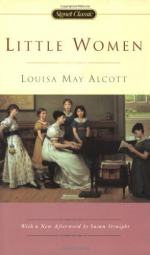|
This section contains 152 words (approx. 1 page at 400 words per page) |

|
Although Alcott herself was politically active and cared deeply about the social and ethical issues of her time, she preferred to keep Little Women on a happy, domestic level. She includes only the subtlest of references to women's suffrage, abolition of slavery, the temperance movement, educational reform, and social welfare programs. There is relatively little violence in the novel and there are no "evil" characters. Compared with modern young adult literature, Little Women portrays a safe world, seemingly free of sexual relations, drug abuse, or divorce. Alcott emphasizes good behavior and honest hard work as solutions to personal and societal problems. Modern critics, however, have questioned traditional interpretations of Little Women, noting Alcott's anger at the subjugation of women to domestic roles.
Jo, Alcott's strongest character, forges through life determined to be independent, and in Alcott's later novels, Jo counsels young women to seek careers rather...
|
This section contains 152 words (approx. 1 page at 400 words per page) |

|




